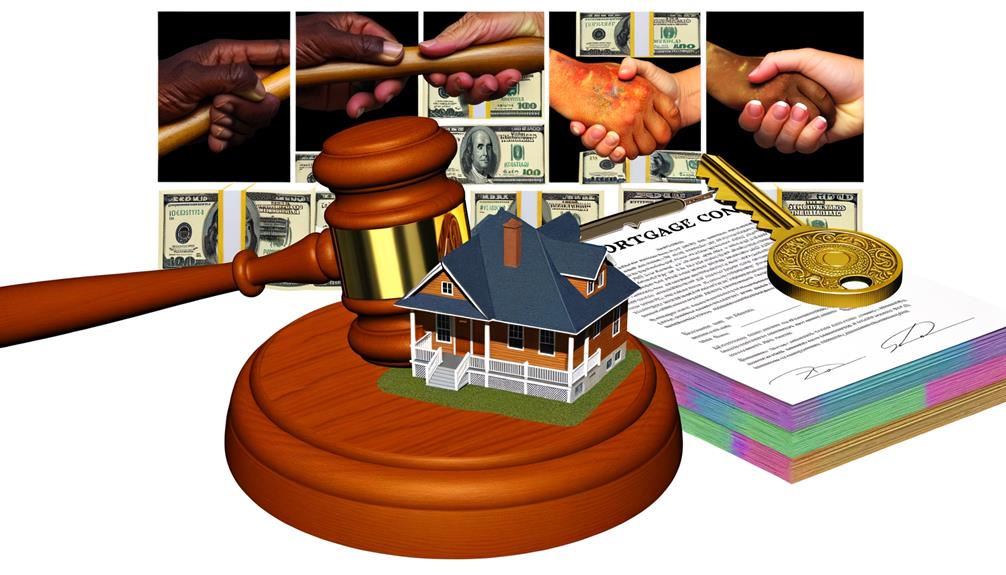Navigating the terrain of property auctions can be a complex endeavor, often raising a multitude of questions for prospective bidders. One such question, frequently encountered yet rarely straightforward, revolves around the necessity of cash for a house auction.
It is a widely accepted fact that a winning bid at an auction often necessitates immediate payment, and more often than not, cash is held as the preferred medium of this exchange. However, the dynamics of this requirement can be far more nuanced than they appear on the surface, influenced by factors ranging from the nature of the auction to the policies embraced by the auctioneers.
As we embark on an exploration of this topic, we invite you to consider the question: Is cash truly indispensable for a house auction, or are there alternative pathways to stake a successful claim in this competitive arena?
Key Takeaways
- Real estate auctions can be conducted publicly or privately, with public auctions requiring immediate payment and private auctions offering more flexibility.
- Cash is a necessity for all types of auctions, but financing options such as hard money loans and peer-to-peer lending can help meet cash requirements.
- Alternatives to cash payments include owner financing, delayed financing, lines of credit, and personal loans, each with their own advantages and considerations.
- Buying a house at auction has its pros and cons, including unique buying opportunities, limited due diligence, fierce competition, and the need for informed decision-making.
Understanding Real Estate Auctions
Diving into the complex world of real estate auctions, it becomes clear that these public marketplaces serve as strategic platforms for various entities, including homeowners, builders, governments, and banks, to sell properties, offering potential opportunities for shrewd investors. These auctions, held in diverse venues from local courthouses to online real estate platforms, involve a transparent and competitive bid process that can lead to lucrative deals for the buyer.
Understanding real estate auctions is critical to success in this domain. Public auctions, often a part of the foreclosure process, require the winning bidder to pay a non-refundable deposit and the entire purchase amount within 24 hours. In contrast, private auction houses, dealing with properties unsold at public auctions, may provide more flexibility in payment terms and allow for a more thorough property inspection.
While cash is king at a house auction, other financing options are available, including hard money loans, peer-to-peer lending, and even financing with the seller. As you navigate the auction process, buying a house at auction can be a viable, profitable venture for investors with a keen eye for value and risk.
Cash Requirements at Auctions
Understanding the cash requirements at auctions is crucial to effectively maneuvering the financial intricacies of purchasing properties at these competitive marketplaces. Different types of auctions, whether public or private, have unique cash requirements.
Public auctions typically require the winning bidder to pay a non-refundable deposit and the entire purchase amount within a day. This immediate cash requirement makes it essential to have your finances in order before participating in a house auction.
Private auctions, on the other hand, often offer more leniency, requiring a smaller deposit and providing a two-week window for property inspection. This allows potential buyers more time to secure financing. However, regardless of auction type, cash is a necessity.
For those seeking to buy a home at an auction, understanding various financing options can be helpful. Hard money loans and peer-to-peer lending platforms can offer quick financing solutions. Alternatively, homeowners could leverage their home's equity to secure a loan or line of credit. These options can help meet the cash requirements at auctions, turning a winning bid into a successful real estate transaction.
Understanding these requirements and options is crucial to becoming a successful bidder at house auctions.
Alternatives to Cash Payments

While cash is often preferred at house auctions, there are several alternative financing options that prospective buyers can explore to meet the purchase requirements. This offers the opportunity to bid on a property at an auction without having cash on hand, increasing the number of potential buyers who can make money from house auctions.
Here are five alternatives to cash payments:
- Owner Financing: This allows you to buy a home with small monthly payments over an extended period.
- Delayed Financing: Purchase properties upfront and refinance later to repay the auction purchase.
- Line of Credit: Similar to a credit card, this could be secured or unsecured.
- Personal Loans: Available from traditional banks or lenders, but may come with higher interest rates.
- Hard Cash Loans: Suitable for property flippers, these are short-term, high-interest loans.
These alternatives provide flexibility and broaden the pool of potential auction participants. It's essential to check with the auction company about their accepted forms of payment before planning an auction purchase. This way, you'll be prepared to secure your dream house at an auction, even without immediately available cash.
Pros and Cons of Auction Buying
Having examined the options for alternatives to cash payments at auctions, it is equally crucial to weigh the potential advantages and drawbacks of purchasing a property through an auction.
The pros and cons of auction buying are numerous. Among the benefits, house auctions present unique buying opportunities. They offer a wider range of properties and the chance to buy a house at a potentially lower price. Real estate auction websites make this process more accessible, providing a platform for auction companies to list properties with their opening bid. The highest bidder may secure a great deal, and the transaction can be faster than conventional real estate purchases.
However, there are also risks to consider. Due diligence is limited, making it harder to thoroughly inspect the property and uncover potential issues. This can lead to unexpected surprises post-purchase. Additionally, competition with seasoned investors can be fierce, raising the opening bid and potentially negating the benefits of auction buying.
Ultimately, understanding the pros and cons of auction buying empowers buyers to make informed decisions, maximizing the potential benefits while mitigating the risks.
Financing a Home Auction Purchase

In the realm of home auctions, navigating the financial aspects can be a complex process, requiring a solid understanding of the cash requirements, financing alternatives, and strategic considerations to ensure a successful purchase. It is more than real estate buying; it is an adventure where houses are sold in a unique way.
To finance the purchase, the following options are available:
- Hard money loans: Known for their speed and flexibility, these loans can be an ideal short-term solution. After the auction, you may immediately refinance into a conventional mortgage.
- Cashier's checks: These are required for the initial deposit and possibly the entire purchase price.
- Home equity or personal loans: These can provide the funds to complete the purchase, but come with their own risks and benefits.
- Seller financing: Some auction houses may offer this option, especially in foreclosure process auctions.
- Minimum bid amount: Understand this amount, as it can dictate the type of financing needed.
Frequently Asked Questions
How Do You Pay for an Auction?
Paying for an auction involves due diligence, appropriate auction preparations, and a solid bidding strategy. Auction financing, understanding auction procedures, legal implications, auction risks, and the closing process are key. Auction etiquette ensures winning bids are handled professionally.
What Are the Cons of Buying a House at Auction?
Auction risks include hidden damages, legal complications, and unsettled liabilities. Unexpected renovations, title issues, and financing difficulties may arise. Bidding wars, limited inspection, and market value uncertainty further complicate the auction process.
What Does Cash Only Mean at Auction?
"Cash only at auction" is a fundamental auction jargon denoting an immediate, full payment requirement by the winning bidder. This buying process carries legal implications and requires strategic bidding, comprehensive property evaluation, and awareness of potential hidden costs.
How Does Auction Work?
Auction processes involve bidding strategies where participants offer prices for properties. Real estate auctions, including online and sealed bid auctions, require pre-auction research, understanding auction legality, etiquette, and dynamics for winning bids.
Conclusion
In sum, house auctions mandate cash availability as standard protocol, rendering conventional bank financing a non-starter. This immediate financial obligation underscores the gravity of auction participation and the necessity of adequate forethought.
The auction arena is not for the financially faint-hearted. It is a place where cold, hard cash rules supreme, forcing the world of finance to bow to its unequivocal dominion. Thus, to tread the auction path, one must be prepared with the king of currencies – cash.


